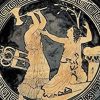When Atreus died, the throne of Argos was inherited by his son Agamemnon, who married Clytaemestra, the daughter of the king of Sparta. They had three children — Iphigenia, Electra, and Orestes. The other son of Atreus, Menelaus, married Helen, the sister of Clytaemestra, and in due course became the king of Sparta when her father died.
Most of the Greek chieftains had been among the suitors of Helen, for she was renowned to be the most beautiful woman in the world. They had made a pact to accept without protest her choice of a husband and to come to his aid if anyone attempted to steal Helen from him. Sometime after Helen and Menelaus were married, Paris, the son of the king of Troy, came to Sparta. He seduced Helen and carried her back with him to Troy. Faithful to their oaths, the chieftains rallied with their armies to the call of Menelaus. A great force was mobilized to capture Troy and restore Helen to her rightful husband. Agamemnon, as leader of the largest contingent, was made commander.
The expedition assembled at Aulis, on the eastern coast of Greece, but was unable to sail for Troy because of adverse winds. Calchas, a soothsayer who accompanied the army, declared that the goddess Artemis was responsible and could only be appeased by the sacrifice of Agamemnon’s daughter Iphigenia. Agamemnon was appalled by this command and refused to obey, but finally gave in to the pressure put on him by the other chieftains. He induced Clytaemestra to send Iphigenia to Aulis by claiming that the maiden was to be married to Achilles, the greatest of the Greek heroes. When the young girl arrived at the camp, however, she was sacrificed to the goddess. After this the wind changed. The army boarded its ships and set sail for Troy.
Meanwhile, Aegisthus returned to Argos in the absence of Agamemnon. He began to plot against his cousin in the hope of regaining what he considered to be his rightful place on the throne, and of avenging the treatment his father and brothers received at the hands of Atreus. Aegisthus discovered that Clytaemestra had developed a bitter hatred for Agamemnon because of the sacrifice of her daughter. Her enmity for her husband continued to increase as she received reports of his infidelity with other women while on campaign at Troy. Before long, Aegisthus and Clytaemestra became lovers. They shared the same hatred for Agamemnon and began to conspire together. They planned to murder him when he came back to Argos.
The siege of Troy lasted ten years. Finally the city fell and was sacked by the Greek army, its temples were destroyed, and the surviving inhabitants were sold into slavery. The first play of the trilogy, Agamemnon, takes place in Argos shortly after the fall of Troy.
Agamemnon returns home with only one ship because his fleet was scattered by a storm at sea. He is accompanied by his newest concubine, Cassandra, the daughter of the king of Troy. Aegisthus remains in the background while Clytaemestra gives her husband an affectionate welcome and the people of Argos applaud their victorious king. Later, Clytaemestra traps Agamemnon in his bath and kills him with an axe. Cassandra is murdered also. Clytaemestra and Aegisthus announce the murders to the people, overcome the opposition of the Elders, and set themselves up as the new rulers of Argos.
The action of The Choephori, the second play, takes place a few years later. Orestes, the son of Agamemnon, has been living in exile in the nearby kingdom of Phocis. In obedience to a command given him by the god Apollo, Orestes returns to Argos to avenge his father. He seeks out his sister Electra, then gains admittance to the palace by disguising himself and kills Clytaemestra and Aegisthus. Orestes tries to justify the murder of his mother, but in the final scene of the play he is afflicted with madness and flees in terror from the Furies, hideous spirits who hunt down and punish murderers.
The story of The Eumenides, the last play, begins a few days later. Orestes seeks refuge in the sanctuary of Apollo at Delphi. He is forced to wander as an outcast for the next few years, with the Furies constantly tormenting him. Finally he arrives at Athens and throws himself on the mercy of the goddess Athene. The Furies follow him there and insist that Orestes must be punished for matricide. He claims that he acted according to Apollo’s dictate and is not responsible for the crime. Athene convenes a special court to hear the case, but the jurors are unable to reach a verdict. Athene casts the deciding vote and Orestes is acquitted. The Furies angrily threaten vengeance on Athens, but Athene clams them by the offer of a position of honor in the cult of her city. They accept. The ancient Furies are transformed into benevolent spirits. Their name is changed to the Eumenides, or “kindly ones,” to symbolize their new character.
The legends about the family of Atreus were among the most popular in the Greek mythological heritage and many versions of them were known in the ancient world. Some elements of the story are recounted in the Odyssey of Homer. Pindar and other poets made use of the legend also, and it provided the plots for many tragedies in addition to the trilogy by Aeschylus, including Electra by Sophocles, and Electra, Orestes, Iphigenia at Aulis, and Iphigenia in Tauris by Euripides. A complete account of the legend, with reference to all its sources and variant versions, will be found in Volume II of The Greek Myths by Robert Graves, available in paperback edition, or in any other good handbook of classical mythology.

